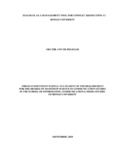| dc.description.abstract | Other approaches have been used for decades to solving issues in Kenyan public universities, but
the methods have been found to be less humane and costly. The need to embrace dialogue is a
better approach in conflict resolution and should be encouraged towards a transformed society.
This study investigates dialogue as a management tool for conflict resolution at Rongo University.
It raises the need for knowledge of what dialogue is, competence in how to employ dialogue and
its use for it to be a tool in conflict resolution. Employees move beyond any one individual’s
understanding to gain new insights and create new ideas in ways that cannot be achieved
individually. It describes the dialogue process and explores how it shifts both individuals and a
group to a collective, shared understanding. In dialogue all parties involved are givers and takers,
dialogue can be carried out at different levels at which participants are influenced or influence
others. The study was guided by the following objectives; to identify the importance of dialogue
in conflict resolution at Rongo University, investigate the requirements for dialogue in conflict
resolution at Rongo University and examine if dialogue can be used as a sustainable management
tool in conflict resolution at Rongo University. Data was collected from employees of Rongo
University. Descriptive study was applied, and purposive sample used. The target population was
a total of 500 employees and a sample size of 217 using Krejcie and Morgan sampling table. It
was anchored by dialogue theory. Qualitative and quantitative approaches were adapted using
questionnaires and observation. Tables, graphs and pie charts were used in data presentation.
Results indicated that some of the approaches used in conflict resolution were due to delays, fear
of dialogue, and insensitivity of management. The conclusion from the study was that dialogue
had not been fully embraced and lack of dialogue was due to the attitude that has developed over
time. Employees have not been adequately informed on the importance of embracing dialogue as
a better approach to conflict resolution. | en_US |

